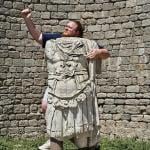The first indication that sex-for-sex’s-sake is a major thou-shalt-not comes in the opening chapters of Genesis. Adam and Eve have just tasted the fruit of the tree of knowledge of good and evil, thereby violating God’s single condition on their life in Eden. Prior to their tasting the fruit, “they were both naked, the man and his wife, and were not ashamed” (Gen 2:25). Afterward, however, “the eyes of both of them were opened, and they knew that they were naked, and they sewed fig leaves together and made themselves coverings.”
Knowing good and evil, Adam and Eve suddenly feel shame in their nakedness where a moment before they hadn’t. What’s the connection? Obviously, their nakedness hasn’t changed. The change, thus, is in the way they look at one another. Their gaze has been altered. For the first time, their desires for one another have been contaminated with lust. Adam does not see Eve, who happens to be naked; nor does Eve see Adam, who also happens to be naked. Their nakedness has acquired priority. The flesh, not the person, is now the thing seen. Each has become, in the eyes of the other, a sexual object.
Where before Adam and Eve had been moved to sexual relations as an expression of conjugal love, a natural instinct by which God’s directive to be fruitful and multiply would be fulfilled, lust has thrown things off kilter. The wondrous but delicate equilibrium of Eden is now shattered. Lust is an appetite, a bodily desire experienced independently of love. Previously, their bodies’ desires had been led in all things by their spiritual inclinations. That to which their souls were drawn also fed their bodies; they had no need, no thought, to satisfy their bodies apart from their souls. The integration was perfect. The hierarchy was perfect as well. God commanded their souls. Their souls commanded their bodies.
But the moment Adam and Eve ate the fruit, that hierarchy was broken. Their souls would not be commanded by God—Who had expressly forbidden them to do so. Consequently, their bodies would not be commanded by their souls. As their souls had rebelled against God’s rightful dominion, their bodies began at once to rebel against their souls’ rightful dominion. They felt lust. And because they felt lust, they felt shame. They knew good and evil. They knew right and wrong. They made bad choices. The first punishment after the Fall is, literally, a disintegration, a breaking down of the divinely just order.
Saint Augustine makes this point in the City of God. After Adam and Eve eat the forbidden fruit,
They experienced a new motion of their flesh which had become disobedient to them, in strict retribution of their own disobedience to God. For the soul, reveling in its own liberty, and scorning to serve God, was itself deprived of the command it had formerly maintained over the body. And because it had willfully deserted its superior Lord, it no longer held its own inferior servant; neither could it hold the flesh subject to God (13: 13).
The Fall, therefore, marks the loss of the human soul’s natural dominion over the human body. “Then began the flesh to lust against the spirit,” Augustine writes, “in which strife we are born.” The history of mankind will, from that moment onward, comprise a struggle for supremacy between human beings’ spiritual aspirations and their fleshly desires.
The striving between the soul and the flesh signals, in Augustine’s view, the disintegration of Edenic harmony. Lust is the signature of the striving. And off we go. It’s through Augustine, in large measure, that the Christian tradition will evolve its wariness of, and occasional disdain for, sexuality. The logic is predictable; after all, sex is the fleshly distraction par excellence. If life is directed toward the greater glory of God, onward and upward, then energy devoted to the pursuit of sex is energy diverted from its proper goal. “Lust not only takes possession of the whole body and outward members,” Augustine writes, “but also makes itself felt within, and moves the whole man with a passion in which mental emotion is mingled with bodily appetite, so that the pleasure which results is the greatest of all bodily pleasures” (City of God 14:16). Lust overtakes the inner drama of a man’s life, strutting and fretting across the stage while his soul hangs in the balance. In an especially graphic moment, Augustine explains how it culminates with an actual bringing down of the curtain: “So possessing indeed is this pleasure, that at the moment of time in which it is consummated, all mental activity is suspended.” The cessation of thought at the instant of sexual climax is, for Augustine, emblematic of the spiritual peril to which lust subjects the soul. Renaissance dramatists famously took note of this phenomenon, referring to orgasm as the “little death.” Hence, to die in Shakespeare’s plays occasionally means to ejaculate: “I will live in thy heart, die in thy lap, and be buried in thy eyes” (Much Ado About Nothing V.ii.99-101) and “I will die bravely, like a smug bridegroom” (King Lear IV.vi. 201).













